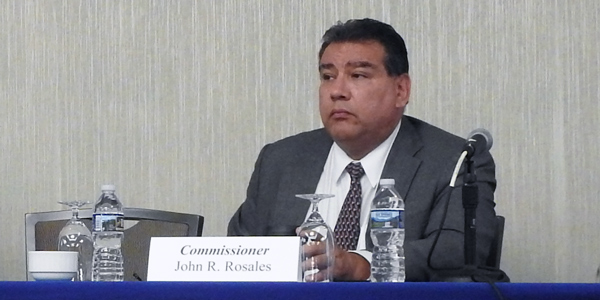By Rich Heidorn Jr.
State regulators warned PJM last week that it should avoid any capacity market changes that would increase costs or restrict state policies setting generation preferences.
In a letter Oct. 9, the Organization of PJM States Inc. said it has “increasing concerns” with the discussions in the RTO’s Capacity Construct/Public Policy Senior Task Force (CCPPSTF).
OPSI President John Rosales, a member of the Illinois Commerce Commission, said some proposals being discussed by the task force could raise prices significantly and “result in unjustified restrictions of lawful state public policies regarding preferences for characteristics and attributes of electricity supply resources.”
PJM stakeholders approved the task force in January following months of debate. The group’s issue charge called for a “proactive” review of the Reliability Pricing Model to ensure stakeholders are involved in the RTO’s response to “unforeseen events” such as proposed power purchase agreements for coal plants in Ohio and the adoption of zero-emission credits for nuclear plants in Illinois that are at risk of closing because of low market prices. “The failure to successfully anticipate these occurrences resulted in important policy debates circumventing the PJM stakeholder process and going directly to litigation at FERC,” it said. (See PJM to Review Impact of State Public Policies on RPM.)
Rosales’ letter contrasted the task force’s charge to identify “areas where state actions and the current RPM capacity construct may not be aligned” with the Capacity Performance rules enacted after the 2014 polar vortex resulted in the loss of 22% of the RTO’s generation. “Unlike PJM’s initiative to implement the Capacity Performance proposal, there has been no demonstration of facts, data or information other than hypothetical fears supporting the concerns” of the task force, he said.
“Some of the proposals would revise the procedures for resource eligibility to participate in the Base Residual Auction (BRA) and the implementation of the RPM to administratively adjust resource offers and raise the price for capacity. Based on estimations provided in the CCPPSTF, it appears customers are at significant risk of increased cost for capacity. … Regardless of intention, neither artificially and unnecessarily higher capacity costs nor improper restrictions on state public policies would be acceptable to OPSI.”
The group criticized the task force’s charter, saying that barring discussions of impacts outside of the capacity market “will almost certainly raise the potential for distortions in total supply costs paid by customers.”
The regulators also criticized the task force’s “accelerated timeline,” saying it increases the risk of implementing rules before they are fully vetted and ignores the backlog FERC is attempting to eliminate following its six months without a quorum.
Failing to consider “the intended, and unintended, consequences” of the task force proposals “will likely produce overly narrow, inefficient and excessively costly results,” OPSI said.
“OPSI does not believe PJM has demonstrated any convincing reason to interfere with the lawful pursuit of state public policy in the OPSI jurisdictions. Nevertheless, if PJM persists in proceeding, OPSI would urge PJM to revise its CCPPSTF timeline and process to allow for more robust, comprehensive and appropriate” discussions.





